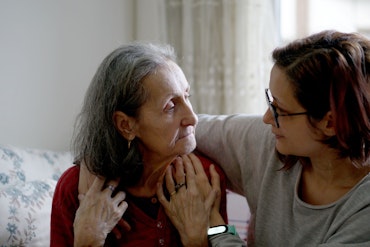Death Over Dinner arrives Down Under
Breaking the rule of never discussing death at the dinner table, Death Over Dinner (DOD) has come to Australia.

Death over Dinner encourages all Australians to toast life, honour loved ones who have died and express their wishes for end of life care.
This American initiative encourages people to have conversations about end of life and End of Life Care at the kitchen table rather than in the Intensive Care Unit (ICU), when it’s too late and has been launched in Australia by the Australian Centre for Health Research (ACHR).
Death Over Dinner Down Under is an interactive website that encourage Australian’s to break the silence on talking about death and start the conversation with family and friends well in advance of an accident or an emergency when people are overwhelmed or unable to communicate.
“Around 70 per cent of Australians want to die at home, but sadly less than 14 percent do. While ACHR research has found that 89 percent of Australians say it’s important to talk about their end of life wishes, few actually have that conversation,” says Rebecca Bartell, Executive Director of ACHR.
“Instead conversations about end of life care often take place at a hospital in the midst of a crisis. Decisions have to be made quickly and under stress. This means many people die in a way they wouldn’t choose. Loved ones are left feeling guilty, bereaved and anxious.
“We are calling on all Australians to fill their table with food, family, and friends. Toast life, honour loved ones who have died and ensure that everyone’s wishes for end of life care are expressed and respected with understanding and compassion,” she says.
At the regional launch of Death over Dinner in Geelong, the founder Michael Hebb and local medical practitioners highlighted the importance of tackling the challenging topic of end of life care and why the dinner table is the best place to have this conversation.
“Ensuring people have a say in their end of life care is an important issue that is becoming more and more relevant as the population ages,” says Professor Brendan Crotty Executive Dean of Health, Deakin University which hosted the event.
“A recognition that individuals are best placed to decide what end of life care they want is embedded in our medical, nursing and allied health courses and increasingly a part of our research activities. We are delighted to play our part in supporting initiatives, such as Death Over Dinner, that encourage people to talk about health care and end of life planning with their loved ones before it is too late,” he says.
The Death over Dinner interactive website, deathoverdinner.org.au, has a wealth of tools, information and materials to guide you through the process of hosting a dinner for a variety of different guests, to talk about death.
Although Australia is the first official satellite site outside the USA, DOD is an international movement and in the past two years, more than 100,000 people in over 30 countries have gathered to dine and discuss their views on a “good” death, and the issues that matter to them.























